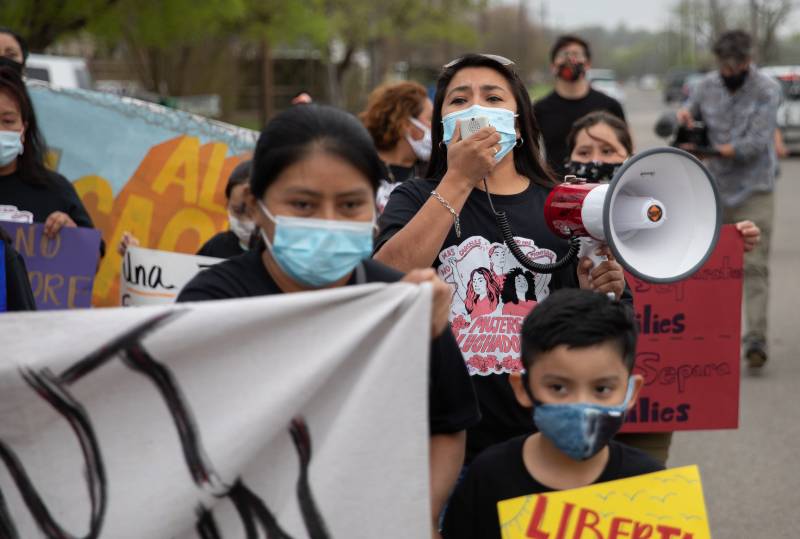To try to counter the souring public mood, the four largest prison companies, including GEO and CoreCivic, formed a trade group called Day 1 Alliance.
“There’s been a multitude of misinformation out there, and so I really wouldn’t look to public sentiment for that because there are so many mistruths out there about the industry,” says Alexandra Wilkes, national spokeswoman for the alliance.
But Mark Fleming, associate director of litigation at the National Immigrant Justice Center, which works against the industry, says: “The private prison companies are certainly facing some headwinds here. They are definitely increasingly unpopular in the public sphere.”
Finding ways to keep doing business
Hutto, which opened in 2006, was troubled from the beginning. There was a successful ACLU lawsuit over substandard living conditions, and later, allegations of sexual assaults.
In Taylor, as in many places that have private prisons, the locality acts as a middleman between ICE and the detention company, so there is a forum for public complaints.
In Williamson County, where Taylor is located, immigrant advocates asked the commissioners to sever the contract with Hutto. And in 2018, they got their way when the commissioners voted to wind down the contract.
But the celebration was only temporary. Last year, ICE and CoreCivic — the company that runs Hutto — signed a 10-year contract that bypasses Williamson County and public opposition altogether. Hutto stayed open.
Prison companies “have found ways to keep doing business,” Fleming says. “They have proven over the years that they are resourceful and resilient.”
As elected bodies in prison towns are becoming more responsive to angry citizens, ICE has increasingly relied on this workaround — the agency contracts directly with a prison operator and avoids messy public meetings. ICE says it has to have a place to detain deportable immigrants, about one-third of whom have criminal charges.
The same thing happened on an even larger scale in California. Two weeks before a sweeping state law that would have phased out for-profit detention went into effect last year, ICE quietly signed long-term contracts with three companies to keep their facilities open.
ICE also tried this tactic in Ionia, Michigan, but now the outcome is uncertain.
In 2019, the agency announced its intention to open a 600-bed detention facility in that town between Grand Rapids and Lansing. But local opposition quickly formed, the governor came out against it and even the all-GOP Ionia County Board of Commissioners gave it a thumbs down.
“We took that as really good news that the proposal was shut down so quickly,” says J.R. Martin, with No Detention Centers in Michigan. “We learned that pretty much as soon as that decision had been made, ICE was working on whatever they could do to go around it and to find some other way of establishing a new facility in that area.”
ICE sidestepped the naysayers and began the process to contract directly with a detention company to build a brand-new, 150,000-square-foot jail in Ionia.
A lot has changed
But since then, a lot has changed. The population of ICE detainees has plunged from a peak of more than 56,000 to about 15,000 today because of concerns over COVID-19 contagion in living quarters.
Ron Vitiello, acting ICE director for 10 months in 2018 and 2019, said there’s no longer a need to expand detention after the release of detainees because of the pandemic and because many migrants are still turned back at the border under a Trump-era health order. Vitiello also noted Democrats now control Congress.
“There’s no need for an increase in bed space. They don’t need more detention space for more adult immigrants who are getting expelled under Title 42,” he said. “Congress isn’t about to add money for ICE detention — not with this crowd. I just don’t see it.”
The contract in Ionia has apparently gone cold. A spokesman for Immigration Centers of America, the company interested in the Ionia contract, tells NPR that ICE has stopped moving forward with all three detention contracts the company was pursing — in Michigan, Illinois and Maryland.
ICE has confirmed that it dropped its plans to build a new detention facility near Chicago.
This is happening at a time when hostility to for-profit immigrant jails is swelling. California, Illinois and Nevada have all taken steps to restrict the business of privately operated jails. Now, New Jersey, New Mexico, Washington state and Maryland are considering doing the same.
“More and more the movement has begun to see that shutting down immigration detention centers was a key part of stopping the deportation machine,” says Silky Shah, executive director of Detention Watch Network.

9(MDAxOTAwOTE4MDEyMTkxMDAzNjczZDljZA004))
